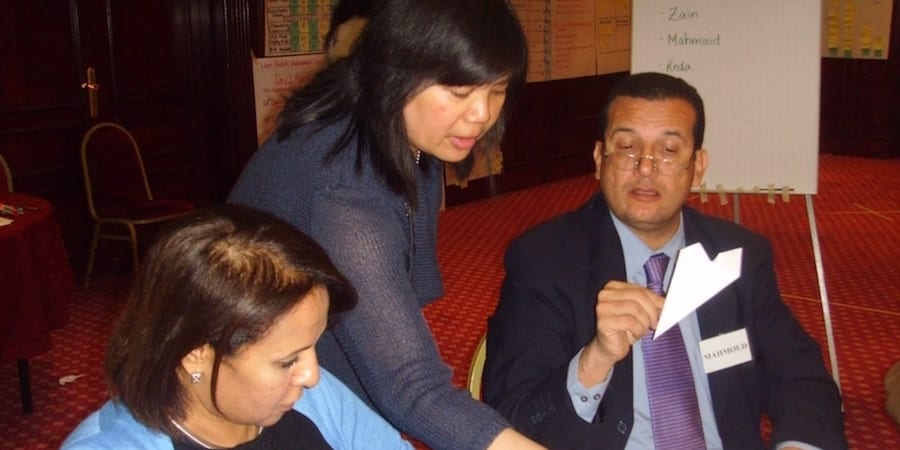
Testing the effectiveness of distance learning in Russia
FEATURE – When done well, distance learning can be as effective as direct participation in a summit. The author reflect on a recent experiment and wonders whether distance makes the heart grow… leaner.
Words: Vyacheslav Boltrukevich, MBA-Production System Program Director at Lomonosov Moscow State University Business School and Founder of Lean Enterprise Institute Russia.
At 7:30 pm on March 7th, 2017, the first speaker – none other than Jim Womack – took to the stage to share his latest insights into the progress of the lean movement. If 7:30 in the evening sounds like a strange time to open a lean event, it’s because it is: the Lean Transformation Summit was actually taking place in Carlsbad, California – some 6,150 miles and 11 time zones away from Moscow, where a group of students had joined me to follow a live stream of the conference.
I run a course in Operations Management at Moscow State University Business School. As a teacher, I try to make my classes as interesting and useful for my students as they can possibly be. Over time, this has convinced me to move away from traditional teaching and come up with my own structure and approach: for instance, I want my students to see lean in action (rather than simply listen to me talking about it), which is why I took them on several gemba walks in a number of organizations here in Russia. The live stream of the 2017 Lean Transformation Summit was going to be another experiment to try and deliver learning in a new and innovative way.
Making sure students leave my classroom inspired is particularly important to me, especially because the course I run is the last in the program that they attend before graduating. I feel a strong sense of responsibility, which is why I was so thrilled to see 20 students and alumni show up for the all-night streaming event (that was even taking place on the eve of a national holiday in Russia). Our Lean Night in Moscow experiment was shaping up to be a great success.
The idea of streaming the summit in Russia stemmed from a conversation between John O’Donnell (Executive Director of the Lean Global Network) and I seven weeks before the summit, during my visit to the Lean Enterprise Institute office in Cambridge, Massachusetts. “Wouldn’t it be great to include the summit in my course at Moscow State University Business School? We should live stream it for my students!” I said.
It didn’t take long for John to suggest the experiment. “You have the audience, we have streaming capability. Let’s do it, and then describe the experience and share our thoughts on long-distance learning via Planet Lean,” he said. After all, this is perfectly in line with the Lean Global Network mission of spreading lean thinking and practice around the world.
On the night of the summit, as one speaker after the other spoke from the main stage in Carlsbad, on the other side of the planet we were busy taking notes, jotting down questions, and learning. During the first break, we shared thoughts and emotions, over the night’s first (of many) cup of coffee. “It seems crazy to think that same Jim Womack was standing in this very room five years ago for his seminar,” one of the students said. “That’s such a clear explanation of what a daily management system is… What a great story from Jim Lancaster,” commented another.
At 10 pm, the breakout sessions began in Carlsbad. Some of the folks in Moscow “attended” the one on mindfulness, while others decided to hear from Jeff Foster about his improvement experience at the San Diego Zoo. It was great to see so much knowledge being shared, covering the same issues we had been discussing in class. There was a real buzz in the room, despite it being nearly midnight by the time the breakout sessions drew to a close. I decided to capture the moment in a picture that I then sent to our colleagues at Lean Enterprise Institute, right before John Shook took to the stage at 3 am (Moscow time) to wrap up the first day of the summit.

Shortly after John started talking, our picture popped up on the screen behind him. What a surprise! Now the audience in California knew of our night-time rendezvous in Moscow. That was a big learning for our students, who realized that lean thinking is not just about improving processes or increasing efficiency, but mostly about creating meaningful relationships with the people around us who can help us in our learning, no matter how far they might be.
Our Lean Night prompted many questions from my team of students, which I had a chance to discuss more in detail once class resumed a few days later. We had created something of a pull system for new knowledge, based on the topics that had been covered at the summit. The students were very enthusiastic about being given access to world-class expertise, and participating (even remotely) to such a gathering of brilliant minds was of great value for them. When a few months later we were reflecting on the course, Lean Night appeared to be one of its highlights for the attendees: they told me it was a very unique way of learning, one they would have never thought could be so beneficial.
I believe that universities and schools around the world should consider including participation to summits in their programs. I was quite surprised to see how impactful the virtual participation to the conference was in the learning path of my students: seeing such great examples of lean thinking and practice and being able to readily access knowledge helped them to put lean in perspective. And it helped them to grasp the many nuances of the methodology. Needless to say, this is also a cost-effective and easy solution for communities of lean thinkers that are based in countries where lean is still taking its first steps (Russia is certainly one of them) and where its body of knowledge is not as easily accessible as it is in other parts of the world (we still have very few lean books in Russian, for instance). This is a model that can be replicated all over.
It was a very unique feeling to sit thousands of miles away from the Omni La Costa Resort in Carlsbad, while knowing we were somehow there as well (both in spirit and through the Internet). It really showed us how many under-utilized applications there are to technology when it comes to sharing knowledge: the main purpose of our experiment was to add to the students’ learning experience, but along the way we also discovered an alternative way to spread the lean word. Indeed, we found that seeing so many people from around the world asking themselves the same questions we ask ourselves, struggling with same things we struggle with, and sharing our same views can act as a powerful catalyst for the spread of lean, because it tells us that we are not alone on our journey. It’s a lesson that we at the Lean Global Network treasure.
Simply connecting a couple of wires and showing a live video, however, is not enough to ensure the success of long-distance learning event. Facilitation is crucial: I now realize, for example, that we could have prepared better by learning more about the speakers and the companies presenting before the summit began. This would have provided context to the presentations.
Another thing I learned is that expectations should be realistic: we had planned to discuss the topics raised in California during the breaks and link them to what we had covered in our course (and, perhaps, even to the Russian reality). That didn’t happen, as we were so busy analysing the content of each presentation there was little to no time left to draw connections with other topics (something that could work well a few days after the event or immediately after, time zone permitting).
There is no doubt this was an outstanding experience that will stick with my students for a very long time. For us at the Lean Global Network, it is a fundamental lesson learned that has revealed yet another vehicle we can use to impact the world through lean thinking.
A few weeks after the Lean Night, as the course at the Business School ended, the students gave me a box of specially-made “Kaizen” wine as a present, to thank me for the all the things they had learned during the course (both in the day and at night) – a very rewarding and moving way to end this year’s course for me, and hopefully a head-start for them as they move on into the business world.

THE AUTHOR

Vyacheslav Boltrukevich is MBA-Production System Program Director at Lomonosov Moscow State University Business School and Founder of Lean Enterprise Institute Russia.
Read more


PROFILE – While pioneering the application of lean thinking in healthcare, Alice Lee realized that you should always approach teaching as you do problem solving: scientifically, situationally, and with the humility of a learner.


NOTES FROM THE GEMBA – If you need proof that kaizen leads to real innovation, look no further than AIO. This French Tech company that reinvented itself as a karakuri kaizen coach.


ONE QUESTION, FIVE ANSWERS – Change might be scary but, when things do work out, it also brings us incredible pride and sense of accomplishment. We asked five practitioners to tell us what the most satisfying moment in their lean journey was.


FEATURE – In the face of uncertainty, when it’s hard to see the road ahead, we can still make things better day after day by embracing kaizen – until we are out of the woods.

